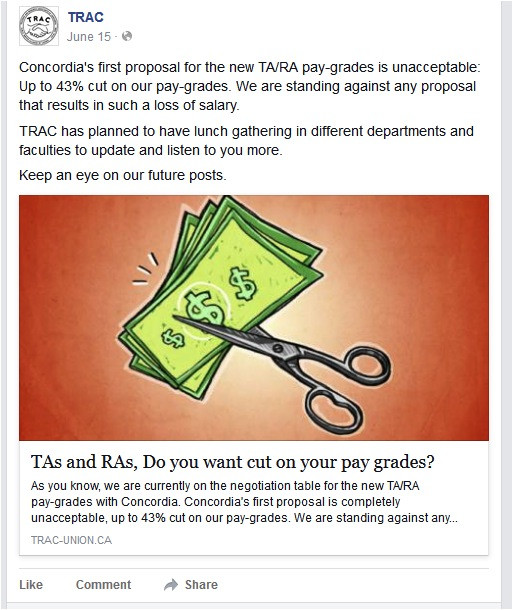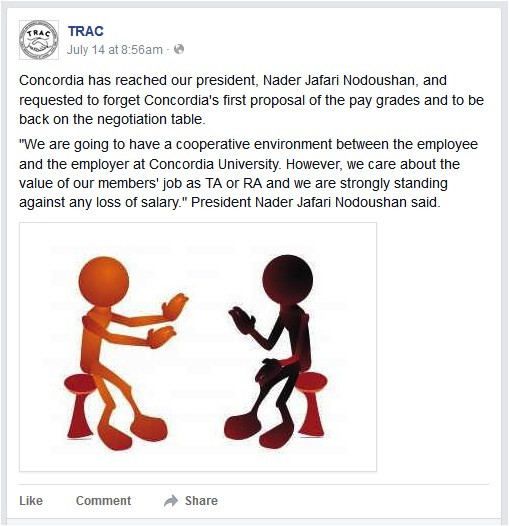Pay Scale Negotiations Between Concordia and Student Teachers and Researchers Union on Hold
UPDATED: Talks between Concordia and its Teaching and Research Assistants (TRAC) have been adjourned until September after the university initially proposed a new pay scale with cuts of up to 43 per cent to the union in May.
Pay grades were the only items left over from last year’s amendment to the collective agreement, as both parties agreed to resume negotiations in November 2014.
A collective agreement is an agreement between an employer and a union usually reached through collective bargaining and establishing wage rates, hours of labor and working conditions. The negotiations in November never happened because of internal conflicts within TRAC.
During negotiations this June, Concordia’s offer was not what TRAC’s bargaining committee was looking for, as it wrote on its Facebook page on June 15.

Then, in July, Concordia contacted TRAC to tell them to forget about that offer.

Both these posts have since been removed from TRAC’s Facebook page, but still appear on TRAC’s website.
According to Robert Sonin, a former TRAC President, bargaining committee member and signatory for the current collective agreement, TRAC is partly to blame for where negotiations are at now.
TRAC conducted a poll among its members during negotiations last summer and saw that they in fact wanted a simplified pay scale, i.e. one fixed rate for each TA level of education—undergrad, masters and PhD.
What was to be negotiated in November was the amount that each rate would be. The TRAC bargaining committee agreed to enter those negotiations with a gameplan to walk out with the best numbers possible.
Then, in November, a scandal emerged.
Executives of TRAC were removed from their posts after an independent report called them “fully dysfunctional.” The report, which was voted down multiple times, was ordered by the Public Service Alliance of Canada, the union’s parent organization and eventually thrown out.
Negotiations had to be postponed until the spring, when Nader Jafari Nodoushan was reelected as president.
Sonin has not rejoined TRAC after serving at the union since 2010, describing it as an organization that has an extremely hard time relaying important information to its members.
“I don’t think they have the experience or the knowledge necessary to do their job,” said Sonin.
These type of negotiations often become contentious according to Jonathan Mooney, a former teaching assistant and bargaining committee member with the Association of Graduate Students Employed at McGill (AGSEM).
McGill’s negotiations with TAs are also suspended until Sept. 1, according to McGill’s website. Mooney took part in the 2011 pay grade negotiations between AGSEM and McGill.
“Going in, from everything that we’d been told, we knew it wasn’t going to be a walk in the park,” said Mooney. “McGill was known, and I think wanted to be known, for being a tough negotiator.
“The largest union at McGill, MUNACA [McGill University Non-Academic Certified Association], was on strike at the time. That bitterly divided the campus population,” he continued.
“Negotiations were therefore very contentious. Relations between McGill and the unions were not great.”
AGSEM wanted wage increases of about 3 per cent per year, which was about on par with inflation, but McGill’s proposal was a 1.2 per cent increase per year, according to Mooney.
“McGill lowballs its unions as well,” Mooney said.
“McGill lowballs its unions as well,” Jonathan Mooney said.
They drew inspiration from TRAC.
“At the time of our negotiations, we were in communication with TRAC, and I remember that other people on the AGSEM bargaining committee were really impressed with the approach that TRAC was taking in their own negotiations, the kinds of things they were demanding and how they communicated with their members,” Mooney recalled.
“We definitely respected and admired the approach they were taking to their negotiations.”
Currently, the TA pay scale at Concordia is the following: salary for TAs depends on both their education level and the kind of work they’re doing.
In the Faculty of Arts and Science, Grade 1 TAs make $24.68/hour. According to the current collective agreement, Grade 1 TAs are tutorial leaders or lab demonstrators.
Only PhD and masters students can be Grade 1 TAs.
Grade 2 TAs, defined in the collective agreement as “responsible for a subset of the duties described above for Grade 1 Teaching assistantship”, make $20.01, $17.79 and $14.47 an hour for PhD, masters and undergraduate students respectively.
The Grade 2 TA definition is not clearly understood.
It’s understood that markers belong to that category. However, Grade 2 TAs do more than just marking.
According to the McGill teaching assistant collective agreement, TAs are paid $26.83/hour, regardless of department or whether they are a PhD candidate or in a masters program. Vacation pay (4 per cent) and statutory holiday compensation is included in that rate.
At McGill, only graduate students can be teaching assistants.
“Depending on department, markers at McGill are paid between $10 and $12 an hour,” says Mooney.
However, TAs sometimes do marking. In that case, they still get paid the $26.83/hour.
It is difficult to do an exact comparison between Concordia and McGill’s pay rates; they have different systems for paying their TAs and markers.
According to Mooney, however, TAs at University of Toronto and York University make around $40/hour.
In fact, TA wages at U of T are $42.47/hour for this year, according to a union representative, after months of striking. Graduate students have a minimum funding guarantee of about $15,000 per year, but graudates often won’t receive more than the minimum.
Graduates are expected to work 200 hours at the $42.47 wage and receive the rest of their funding from fellowships and RA work—which falls outside of U of T’s union for teaching assistants, on top of their academic research work. Over the strikes this past winter, TAs won a new bursary graduate students can apply for, supplementing their funding to total $17,500.
Concordia never comments on ongoing negotiations, according to university spokesperson Chris Mota. She did, however, reveal that the next meeting between TRAC and Concordia will be in September.
TRAC refused to comment on the matter.

_900_600_90.jpg)
_600_832_s.png)

_600_375_90_s_c1.jpg)
_600_375_90_s_c1.jpg)
_600_375_90_s_c1.jpg)